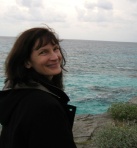“Dumb Animals,” a short story by alumni Ryan Burden (fiction, ’13) appears online at Gulf Stream Magazine.
The March house sits on a rise at the head of the nameless peninsula that lifts the towns of Cavalcade, Mania, and Oshokten from the sea. It’s a Victorian, tall, with a wrap-around porch and seven peaked slate roofs. No effort was spared in its construction. Joints and joists were painstakingly squared until they were considered unassailable. It’s a house tight as a ship. In life, March’s father cared for it as for a living thing, painting and shingling, clipping and mowing, until it seemed a sleek breathing consciousness on the rise, watching the land dispassionately and pondering the sea beyond. He built it with the money from his factory, which made nails. He was a man who knew nails – those with strong steel and heads that won’t buckle, those thin enough to finish fine wood and those heavy enough to run through anything.
Behind the house runs a deep bend of the Oshokten River, where March’s father loved to fish for the dark, bullet-headed trout that laze year-round, gorged on minnows and eel. This is where he drowned, drunk, trying to clear a snagged line during one of the river’s frequent floods...[Keep Reading]…







